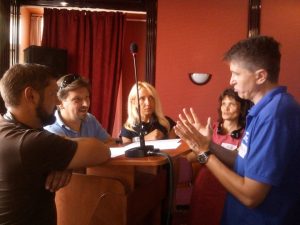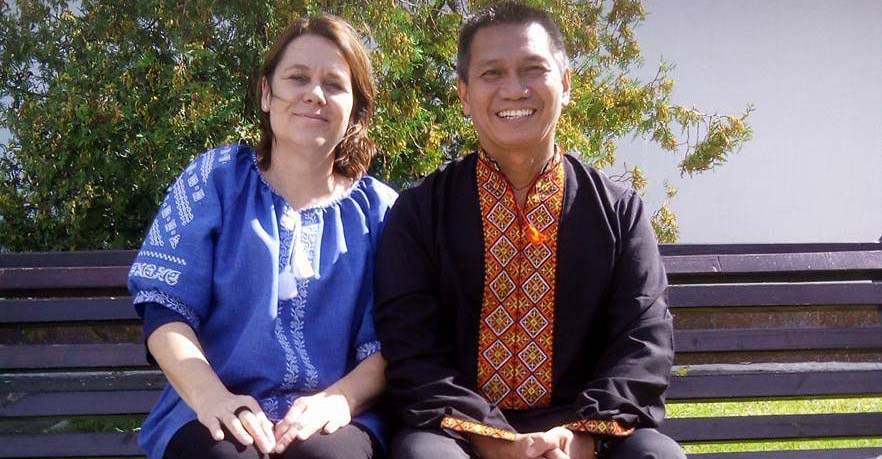
‘We operated and continue to operate in different countries affected by the crisis. There are more than 15 of such states. I visited Ukraine in March for the first time. I was in the buffer zone and communicated with representatives of different communities. You know, I was so impressed that nowadays your country is undergoing such protracted crisis’, Inge Leuverink begins.
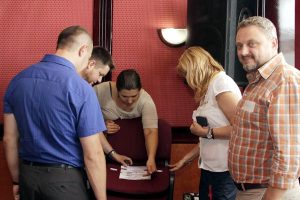 She arrived at Kyiv with her colleague Rustico Binas, an independent advisor on disaster risk reduction and sustainable development at the end of August. During four months, they were conducting a training “Approach to sustainable community recovery” for Caritas Ukraine staff. The theory was combined with practice during these four months. The acquired knowledge and skills will be afterwards implemented at the local level on an everyday basis.
She arrived at Kyiv with her colleague Rustico Binas, an independent advisor on disaster risk reduction and sustainable development at the end of August. During four months, they were conducting a training “Approach to sustainable community recovery” for Caritas Ukraine staff. The theory was combined with practice during these four months. The acquired knowledge and skills will be afterwards implemented at the local level on an everyday basis.
Our guests shared what was learnt, similarities and differences between Ukraine and other countries undergoing protracted crisis, what is necessary to know to overcome it.
Do you have considerable experience in working with countries affected by crisis or undergoing it? In your opinion, what are common challenges for these countries? How to overcome them?
Inge Leuverink, Advisor in humanitarian aid at Cordaid, the Netherlands:
‘Every country has its own history and culture. And of course, work with the community strongly depends on them. But I think all the countries I have cooperated with have a common problem. To be more precise, it is a common mistake on the road to resolve crisis. Instead of listening to communities, understand and inspire them to be independent, we try to sort out problems instead of them. Thus, we are giving a fishing rod instead of a fish. First of all it is necessary to change the attitude. For example, stop thinking that Caritas will come and bring something to these people, and try to discover people’s inner potential and abilities, help them see what they can do in this situation’.
Rustico Binas, an independent advisor on disaster risk reduction and sustainable development:
‘Engagement with communities, especially those in villages is what is rather important. Sometimes, it is even necessary to live there and watch. Not to talk, but listen. Believe me this will bring a powerful result. In my opinion, there is one common mistake for all the countries: we often listen to leaders and do not hear other people. I am quite certain that communities have an immense internal strength which shall be drawn outside. Your task is to discover potential of each society. We taught this during the training’.
You said it is necessary to get involved with communities and listen more than talk. To what extent this formula is universal?
‘Yes, this formula works in all countries, though each country has its own experience. But I would like to add that best results were acquired in those countries where communities were responsible for the project, where people felt that everything is done with their own strength and they create their own life. Results were impressing. Thus, in some countries people we cooperated with became so successful that they started to share their experience with the rest of the country. A community shall understand that they are an engine for changes. And consequently, positive results are right around the corner’.
What do we need to draw out attention to foremost to overcome crisis in the shortest possible time?
Rustico Binas:
‘Just believe me Ukraine is not an exception. And we discussed it during the training. If Ukrainian communities feel they are responsible for changes, positive changes will take place even under the most tough circumstances’.
Inge Leuverink:
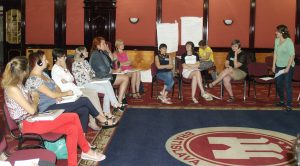 ‘You need to return to a scheme of taking care of each other, when the community takes care of people in need. I think you had such tradition, however, it was lost with time. And right now it is time to revive it. It is crucial when a community manages itself and does not ask for help from others. You know, there is a certain threat: at present people receive large portions of assistance, but their volume will be reduced with time. Whether will they be able to take care of themselves? This is where danger hides… That is why we need to make people under the patronage be able to get by using their own efforts and resources in the future. I was surprised that almost all the countries undergoing protracted crisis are quite similar. The same situation we face in Congo, Central America and Philippines. Our task is to do everything to make these people self-sufficient in the future’.
‘You need to return to a scheme of taking care of each other, when the community takes care of people in need. I think you had such tradition, however, it was lost with time. And right now it is time to revive it. It is crucial when a community manages itself and does not ask for help from others. You know, there is a certain threat: at present people receive large portions of assistance, but their volume will be reduced with time. Whether will they be able to take care of themselves? This is where danger hides… That is why we need to make people under the patronage be able to get by using their own efforts and resources in the future. I was surprised that almost all the countries undergoing protracted crisis are quite similar. The same situation we face in Congo, Central America and Philippines. Our task is to do everything to make these people self-sufficient in the future’.
So the issue is about unification?
Rustico Binas:
‘No doubts! When a society is disconnected, the only way to sort out this problem is to unite it. It is important for every person to feel a common value to identify themselves. You know, when people feel united there is a hope for the better future. The way forward foresees making very person valuable, understand importance of each person and a shared membership in something big, such as a certain community. Social processes cannot be missed or reduced. The most important objective is to restore human dignity, which is lost in crisis situations’.
Inge Leuverink:
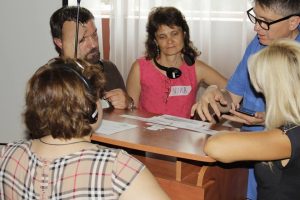 ‘Journalists often ask us the recipe to overcome crisis. Unfortunately, it does not exist. And I have to say, it sometimes feels that the crisis is resolved because the peace has been established, a lull, to be more precise. However, a new wave of crisis overwhelms the country again. We cannot advance or prevent it. It is vital to teach people how to resist this crisis and remain firm. The most important is if it arises again, people must be able stick to their usual pace of life and live a normal life. It is difficult to predict the future or any crisis situations, but give people confidence that they are able to achieve so many things in the life is extremely important’.
‘Journalists often ask us the recipe to overcome crisis. Unfortunately, it does not exist. And I have to say, it sometimes feels that the crisis is resolved because the peace has been established, a lull, to be more precise. However, a new wave of crisis overwhelms the country again. We cannot advance or prevent it. It is vital to teach people how to resist this crisis and remain firm. The most important is if it arises again, people must be able stick to their usual pace of life and live a normal life. It is difficult to predict the future or any crisis situations, but give people confidence that they are able to achieve so many things in the life is extremely important’.
Tags:


